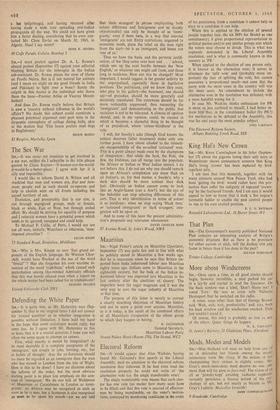Defending the White Paper
Stn,—It is quite true, as Mr. Hattersley says (Sep- tember 3), that in my original letter I did not answer his 'crucial question' as to whether integration is possible without limitation. I have held my hand in the hope that some sociologist would reply, but none has. As I agree with Mr. Hattersley in this at least, that it is a crucial question, I hope you will allow me some space to attempt an answer.
First, whit exaotly is meant by integration? At its most desirable it is complete acceptance of the 'immigrant,' not simply in jobs, housing, etc., but in habits of thought: thus the ex-Jamaican should no more be regarded as an immigrant than the man who has moved to London from the Isle of Wight. How is this to be done? I have no illusions about the tallness of the order, but the most obvious starting point is to place less emphasis on the con- cept of 'immigrant.' We do not talk of Welshmen or Manxmen or Cornishmen in London as immi- grants: an African may be recognised as such as soon as he is seen, but a Scotsman is also recognised ,ss soon as he opens his mouth—yet we are told that `dark strangers' (a phrase emphasising both colour difference and foreignness and so doubly objectionable) can only be thought of as 'immi- grants,' even if born here, in a way that internal 'immigrants' are not. Entry restrictions, ungeared to economic needs, place the label on the man right from the start—he is an immigrant, and hence not ,`one of us.'
Thus we have the basis, and the perverse justifi- cation, of the 'they come over here and . . .' school, which sets up the next hurdle between the 'New English,' or whatever one might call them, and those long in residence. How can this be changed? Most important, I would suggest, is far greater activity by the unprejudiced, especially those in legislative positions. The politicians, and we know they exist, who play to the gallery—the basement, one should say—of prejudice, should be more generally and decisively repudiated. The extremists should be far more noticeably suppressed, thus reassuring the 'immigrants' and demonstrating to the public that racialism is not to be tolerated. A climate of opinion should, and, in my opinion, could, be created in which it becomes a shameful thing to be thought of as prejudiced, where 'colour-blindness' is the rule.
I will, for brevity's sake (though God knows the subject deserves fuller treatment) make only one further point. I have above alluded to the immedi- ate recognisability of the so-called 'coloured' man. This is a point always made even by the champions of integration: that while the Scot, the Pole, the Jew, the Irishman, can all merge into the populace, the African or Indian or West Indian cannot. I do not belielie this. I do not see why one should remark upon an African's complexion any more than on an Italian's, or, for that matter, a Swede's; why a dark skin should be more noticed than dark hair. Obviously an Indian cannot come to look like an Anglo-Saxon (can a Jew?); but the eye of the beholder can stop selecting differences of this sort. That is why identification in terms of colour is so invidious: when we stop saying 'black men,' or 'coloured immigrants' or 'dark strangers,' inte- gration will be upon us.
And to none of this have the present administra- tion's proposals any relevance whatsoever.
DAVID CHARLES ROSS
87 Avenue Road, St. John's Wood, NW8






































 Previous page
Previous page